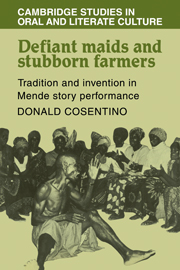Summary
The Mende
Tradition and innovation in the storyteller's art are my themes. The storytellers are the Mende, a West African people numbering about a million who live in the low forests of southern Sierra Leone. They call the stories they create in lively performance dɔmɛisia (singular: dɔmɛi). My critical themes were venerable even in the golden age of the Greeks. My methodology is only less hoary, for it looks back to the time of Chaucer in appreciation of the web which binds tale to teller, teller to audience, and the ensemble to its society.
Mende storytelling must be considered within the context of Mende society. One must know something about that society to appreciate its narrative arts, in much the same way that knowing something about London in the renaissance illuminates the themes of Shakespeare, or appreciating the sociology of Brooklyn Jewry helps to explain the preoccupations of Norman Mailer. So too, the complexities of social life in a farming compound give Mariatu Sandi her narrative themes, and the liberties of low social status in the village allow a rainbow of licentiousness in the performances of Mos'ay Dubua.
Since storytellers are highly selective in their use of materials, the reader must not expect to get a well-rounded view of Mende society from the images projected in their stories. These images act more like reflections from a telescope than a mirror, vastly enlarging some areas and leaving others dark. These enlarged areas – the exigencies of rice farming and the rivalries within the polygamous households, the machinations of the secret societies and the propitiation of ancestral spirits – are the subject of Chapter 2.
- Type
- Chapter
- Information
- Defiant Maids and Stubborn FarmersTradition and Invention in Mende Story Performance, pp. 1 - 15Publisher: Cambridge University PressPrint publication year: 1982

